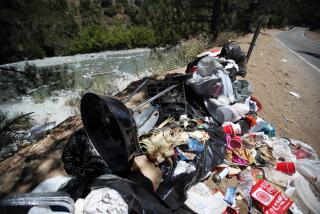Making Way for Progress Amid Pages of the Past
- Share via
The die is cast. I can hear the jackhammers chattering away at the concrete floor of our garage. The remodeling has begun.
I was against it. I told my wife it would take twice as long as she expected and cost twice as much. Besides, we didn’t need it. We already had two bedrooms and two bathrooms--for two people. But she wanted four bedrooms and three bathrooms. She was deaf to reason.
Once we agreed to go ahead, I promised never to say another word against the project, no matter how bad things might turn.
I am going to do that. If I start saying “I told you so,” we will never celebrate another wedding anniversary.
One reason I thought we couldn’t do it was that I thought we could never clean out the garage. It was stuffed to bursting with the accumulations of 40 years of junk. It is done. Nothing remains. Not in the garage, at least.
My wife spent one weekend working in it. She told me to go up to the house and do something else. I know why. She wanted to save everything; I wanted to throw everything away. She knew we would have words.
The contractor provided a plywood shed of about 6 by 7 by 7 feet. She filled it in one afternoon. I don’t even want to know what’s in it. There are also numerous cardboard boxes full of things I had tried to throw out.
The most critical item in this inventory was the pile of scrapbooks in which she had faithfully pasted my columns for 20 years. I knew that if I threw those out it would set a standard: Nothing would be sacred.
However, I mentioned that intention in a column and received a windstorm of complaints.
“I’m dismayed at your threat to junk your scrapbooks,” wrote Gladwin Hill, “and hope you will reconsider such a rash step. I’m sure there are any number of institutions that would be glad to house them, because they are an invaluable, unique sociological commentary on an era. . . .”
“Either you’re kidding or still spaced out by jet lag,” wrote Jack Fulbeck. “To discard those scrapbooks . . . kept by your appreciative if unappreciated wife over the years, would be sacrilege. . . .”
“Such a collection,” wrote Keith Fahey, “should never be thrown away: It is quite certainly a treasure beyond price.”
“For goodness sake,” wrote Roberta Wagner. “I can’t believe you are even semi-serious. . . .”
And I was astounded by a letter from Msgr. Francis J. Weber, archivist of the Archdiocese, offering to keep them in his archives. Considering the irreverent nature of so many of those columns, I was touched.
The issue was settled by my wife. I had put the several bound volumes in the center of the garage, with the rest of the trash to go. A day or two later they appeared in a stack on the patio table, without the plastic covers in which they were bound, by years. My wife said she had removed them to save space. The stack of pages was more than two feet high.
When she was at work the next day a wind came up and blew about 100 pages off the top, helter-skelter. I spent 20 minutes picking them up. Now the stack is on her bedroom floor. I am defeated.
Of course I never really meant to throw them away. I was only trying to suggest that we must be ruthless. It was she, after all, who had saved them, and for me to throw them away was a serious affront. I suppose I could never really have done it.
I did quite well, though. I managed to give the Goodwill several hundred books and phonograph records, a broken toaster, a cat carrier, a box of glassware, six men’s suits, a box of shoes, and a large carton of T-shirts and sweat shirts.
Since first mentioning the books and phonograph records I have received several requests for them; I’m sorry that I acted so hastily. However, anyone who wants the books and records, or even the cat carrier, can probably pick them up at the Goodwill.
An enormous pile of hopeless junk was gathered in the center of the garage and carried away--I suppose to a landfill. I have been told that that is a sin. We are about out of landfill and the problem is acute.
I do feel guilty. But what was the alternative? Sooner or later thousands of people are going to have to clean out their garages. They can do it today or they can do it 20 years from now. OK, 20 years from now how are they going to dispose of it? All the landfills will be full and disposing of trash will be against the law.
By that time, I suppose, we will all be conditioned to recycling almost everything, to save the Earth. But there will always be things that are absolutely useless, non-biodegradable, and non-recycleable. What can one do, for example, with two articles I threw out--a thick foam rubber mattress they gave me at the hospital after my back surgery, and the disintegrating plastic pool cover that we never use. Either they go out or one leaves them to one’s children.
In fact, I believe that one of the biggest problems of the future will be the junk left to children by their parents.
At least I’ve tried not to do that.
More to Read
Sign up for Essential California
The most important California stories and recommendations in your inbox every morning.
You may occasionally receive promotional content from the Los Angeles Times.






